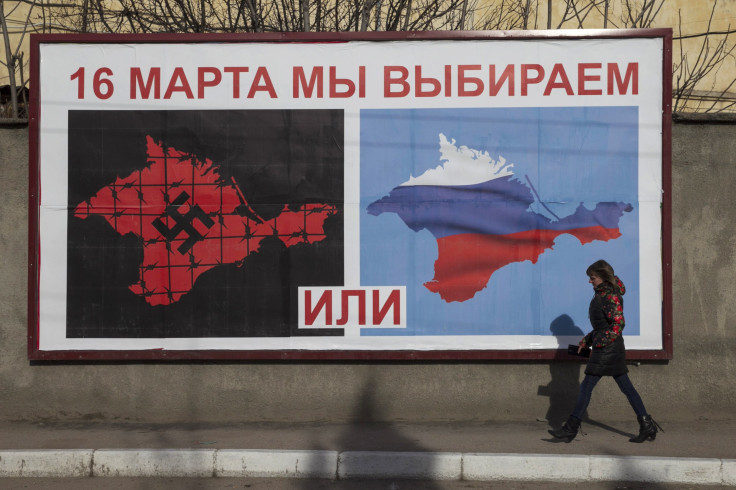How Will Western Sanctions Affect Russia's Economy?

Direct economic impact of the sanctions that have been agreed by Western governments on Russia is likely to be limited since the focus is on key individuals rather than the wider economy. While coverage could be expanded in due course if the crisis shows no signs of abating, deep economic links between Russia and Europe suggest that the West in general is reluctant to take an especially hard line on sanctions, according to Capital Economics.
“Even so, the key point to make is that Russia’s economy is more vulnerable than many seem to believe,” Neil Shearing, chief emerging markets economist at Capital Economics, said in a note. “If the West does tighten the screws, things could quickly get messy.”
Russia’s economic growth slowed to 1.3 percent last year, the worst performance since a 2009 recession.
At a summit last week, the European Union leaders announced to a three-stage sanctions process against Russia, beginning with the suspension of trade and visa-liberalization talks. Stage two includes asset freezes and travel bans for as-yet unidentified officials and would be imposed if Russia boycotts international talks on a settlement. The third level of sanctions would involve wide-scale economic and trade sanctions.
A referendum is set in Crimea for Sunday over whether the autonomous region should secede from Ukraine and align with Russia. The formal decision to impose the sanctions is expected to be taken when EU foreign ministers next meet on March 17.
On Tuesday, U.S. lawmakers passed a resolution that urges the U.S. to “to work with our European allies and other countries to impose visa, financial, trade and other sanctions on senior Russian Federation officials, majority state-owned banks and commercial organizations, and other state agencies, as appropriate.”
On Wednesday, U.S. President Barack Obama pledged to “stand with Ukraine”" when he met with the Ukraine’s new Prime Minister in Washington.
Shearing noted that Western sanctions would mainly affect Russia in two ways.
The first is financial. “For example, tougher sanctions could restrict the ability of Russian banks and businesses to raise capital in Western markets,” Shearing said.
Russian banks’ external liabilities are greater than their external assets. In the event of tougher sanctions by the West, the government may have to use its $490 billion of foreign exchange reserves to bail out banks and corporates that are shut out of global capital markets, according to Shearing.
The second way in which sanctions could affect Russia’s economy is via trade restrictions.
This could be more painful, Shearing explained.
In crude terms, Russia exports energy to the West and uses the income it earns to import manufactured goods in return. A by-product of this has been a boom in consumer spending over the past decade. Trade sanctions would bring an end to this, since they would limit Russia’s ability to import. This in turn could lead to shortages of goods in local markets and a rise in prices.
Yet, such a move would also hurt the West.
If extreme Iran-style sanctions are imposed on Russian exports, the EU would be much more exposed than the US.
The EU is Russia's largest trading partner. Almost half of Russia's exports -- $292 billion worth -- end up in EU countries. Russia, in turn, is the third-biggest trading partner for the EU, with $169 billion in imports.
Meanwhile, the U.S. and Russia trade very little. Russia is the 20th largest trading partner for the U.S., with $27 billion worth of trade exported across the Atlantic. On the flip-side, the U.S. is Russia's fifth largest partner, with just $11 billion worth of trade.
Explore international trade relationships using these neat interactive graphics made by the Organization for Economic Co-operation and Development.
Import origins of Russia (2011)
Export destinations of Russia (2011)
“More fundamentally, tougher sanctions on Russia would risk retaliatory measures by Moscow, including the threat of cutting energy supplies to Europe,” Shearing said. “As such, we suspect that the threat of tougher sanctions will remain a negotiating tool rather than a serious proposition.”
Russia’s energy supplies remain vitally important for the EU, to which it supplies a third of its natural gas. Germany, the euro zone's biggest economy, imports around 40 percent of its gas from Russia. The U.S., on the other hand, is less depended on Russia’s energy due to the shale gas boom.
A senior Russian economic official said Thursday that Russia does not rule out reciprocal action if sanctions are imposed by the U.S. and European countries.
“We hope that there will only be targeted political sanctions, and not a broad package affecting economic trade,” Russia's Deputy Economic Minister Alexei Likhachev said, according to Russia's RIA news agency.
“Our sanctions will be, of course, symmetrical,” he added.
The Ukraine crisis triggered the worst standoff between Russia and the West since the end of the Cold War after Russian forces seized the Crimean peninsula. It began when Ukraine's pro-Russian President Viktor Yanukovych was ousted after mass protests over his decision to scrap an agreement to boost ties with Europe. Yanukovych fled Kiev for Russia in late February but has vowed to return “as soon as circumstances allow.”
On Thursday, the Paris-based OECD said it had postponed activities related to Russia's process for membership in the organization for now.
“As things stand, we think the indirect effect of sanctions could have the greatest impact on Russia’s economy,” Shearing said.
Confidence is already fragile. Capital flight has accelerated in recent weeks, causing the ruble to weaken and forcing the central bank to hike interest rates.
“Simply the fear of further sanctions could exacerbate these strains,” Shearing added. “All of this will weigh on an economy that was struggling even before the crisis in Ukraine escalated.”
© Copyright IBTimes 2024. All rights reserved.






















